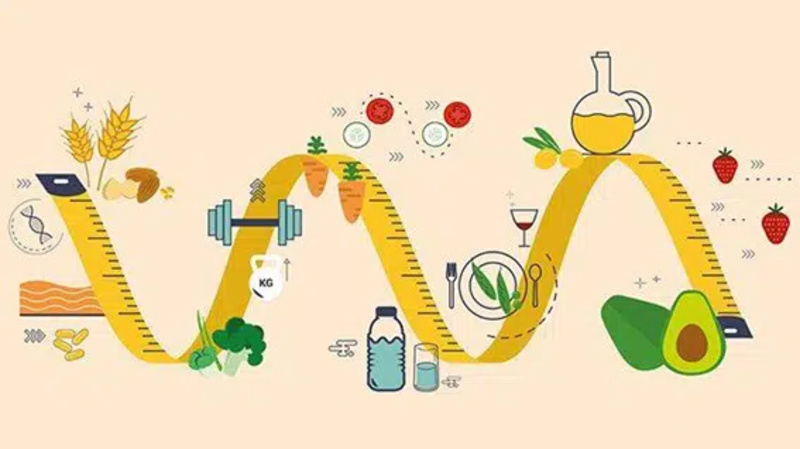Unveiling the Weight Gain Puzzle
Dec 31, 2023 By Nancy Miller
Pursuing a healthy lifestyle often confronts us with the frustration and confusion of unexplained weight gain. Those extra pounds stubbornly cling despite our efforts. This article, through its exploration into numerous factors that contribute to this phenomenon, not only illuminates potential causes but also equips you with insights for making informed decisions on your fitness journey.
Lifestyle Choices and Habits
Living in the Modern Sedentary Age
Technology and convenience dominate our era, making sedentary lifestyles the norm. We spend prolonged hours sitting at desks, in front of screens, or during commutes. These activities significantly contribute to weight gain. Such sedentarism does more than just impact caloric expenditure. It influences metabolic processes that affect the way our bodies store and utilize energy. In the modern sedentary age, we must reevaluate our daily routines.
Poor Eating Habits
The intricate realm of dietary choices extends beyond the concept of calorie counting. It involves navigating through poor eating habits, reliance on processed foods, excessive sugar intake, and inadequate nutrient consumption.
These unhealthy patterns disrupt metabolic processes' delicate balance. Moreover, the body's response to various food types transcends their caloric content. Hormones that regulate hunger, satiety, and fat storage receive influence from this response. To unravel the complexities of nutrition, you must first recognize that food quality significantly impacts overall health and weight management.
Lack of Sleep and its Consequences
More than just a restorative break, quality sleep serves as the cornerstone of hormonal balance. Hormones such as ghrelin and leptin can become dysregulated with inadequate or disrupted sleep, an issue that directly impacts hunger and satiety.
To understand the repercussions of poor sleeping habits; one must recognize its link to amplified cravings for high-calorie foods along with an inclination towards weight gain. A holistic approach to weight management necessitates the prioritization of sleep hygiene and the adoption of practices that promote restful sleep.
Biological Factors
Hormonal Imbalances
Diabetes is often associated with insulin, which beyond its role in lowering glucose, also crucially regulates weight. Insufficient dietary choices or insulin resistance can elevate levels of this hormone.
These elevated levels promote fat storage and impede the breakdown of stored fat. For individuals aiming to shed excess pounds, they must employ a key strategy, balancing this hormonal interplay.
Genetics and Metabolism
Our metabolic destiny fundamentally shapes genetics. The unique gene combination we inherit from our parents dictates how our bodies process and store energy. Recognizing that not all bodies respond to diet and exercise in the same way is a crucial aspect of cracking the genetic code.

Genetics may predispose individuals to specific weight-related challenges, yet they do not dictate an unavoidable outcome.
Metabolism: A Personalized Symphony
Genetic factors influence metabolism, the personalized symphony of complex biochemical processes that sustain life. From person to person, our bodies vary in their rate of calorie-burning and food-to-energy conversion.
Aligning nutritional and fitness approaches with individual metabolic profiles enables us to embark on a more effective, as well as sustainable, journey toward healthy weight achievement and maintenance at a graduate level. It optimizes results by acknowledging the unique operation each body has for maintaining its equilibrium.
The Obvious Contribution of Food to Weight Gain
Dietary Choices and Nutrient Intake
The concept of nutrient density transcends the simplistic approach to calorie counting. It involves prioritizing foods that offer a wealth of essential vitamins, minerals, and bioactive compounds for overall health support.
Emphasizing whole, unprocessed foods such as fruits, vegetables, lean proteins, be they from animal or plant sources, and whole grains is crucial in recognizing this importance. Dietary choices not only manage weight but also influence energy levels, and immune function, and ultimately contribute to long-term well-being.
Macronutrients: The Building Blocks of Balance
To make informed dietary choices, you must understand how macronutrients, carbohydrates, proteins, and fats affect weight management. Each of these macronutrients uniquely serves a purpose within our bodies.
They influence hunger levels, determine energy availability, and regulate metabolic processes. Tailoring dietary intake to individual needs is a process that involves striking an optimal balance in the type and number of consumed macronutrients. It is crucial for achieving overarching health goals.
A nuanced understanding of macronutrients is essential for sustainable dietary practices, whether one's aim is weight loss, muscle gain, or overall well-being.
Micronutrients: The Silent Supporters
Vitamins and minerals, or micronutrients, crucially support metabolic processes and overall health. We must recognize the importance of micronutrient intake beyond simply considering the caloric content of foods.
This recognition necessitates ensuring a diverse, even colorful diet. Energy levels, mood stability, and weight regulation, all can be impacted by deficiencies in essential vitamins and minerals.
A proactive approach to addressing both short-term and long-term health goals involves integrating a variety of nutrient-rich foods into daily meals.
Emotional Eating
Mood and food engage in an intricate interplay with emotional eating, often functioning as a coping mechanism for stress, boredom, or emotional distress. The effects reach beyond temporary relief. Habitual instances of it can precipitate persistent weight gain, a noteworthy consequence indeed.
Stress - From Mind to Mouth
Not only is stress a mental phenomenon, but it also profoundly affects the body's response to food physiologically. Elevated stress levels instigate the release of cortisol and sway food preferences as well as cravings.

The link between high-calorie, sugary food consumption and stress is indeed a well-documented phenomenon. Stress management techniques, cognitive behavioral therapy, and cultivating a mindful approach to eating. These are the strategies employed to disrupt the link between mood and scale.
Role of Medical Conditions
Medical Conditions and Medications
PCOS
Polycystic Ovary Syndrome (PCOS), a hormonal disorder, extends its repercussions beyond reproductive health. A prevalent feature of PCOS is weight gain, especially around the abdomen. In managing weight within the context of PCOS, you must adopt a multifaceted approach.
Lifestyle modifications, dietary changes, and potentially, medications are necessary. Individuals navigating the challenges of PCOS must recognize the crucial interconnectedness between hormonal health and weight management.
Antidepressants - Navigating the Medication Maze
Many antidepressants and certain medications can induce weight gain as a side effect; thus, comprehending the impact of medication on body weight demands an intricate equilibrium between mental health and physical well-being.
Individuals prescribed antidepressants must actively engage in transparent communication with their healthcare providers. This dialogue should explore either alternative drugs or supplementary strategies, both aimed at minimizing the influence on weight.
Individuals empowered by their recognition of the intricate relationship between mental health treatment and weight management can then make informed decisions about their overall well-being.
Other Factors Contributing to Weight Gain
Age-Related Changes in Metabolism
As we age, physiological changes impact our metabolism and body composition; notably, the decline in muscle mass, referred to as sarcopenia, triggers a reduction in basal metabolic rate.
To comprehend the challenges presented by these age-related alterations, you must adopt fitness strategies that prioritize muscle preservation, incorporating robust strength training into your regimen. Taking a proactive stance towards age-related metabolic shifts involves adjusting dietary habits to bolster overall health and counteract the intrinsic propensity for weight gain.
Hormonal Flux in Menopause
Menopause introduces women to hormonal fluctuations that actively affect body weight: shifts in estrogen levels correlate with changes in fat distribution and an escalated inclination towards abdominal weight gain.
The pursuit of managing these menopausal weight challenges necessitates a holistic approach. It comprises hormone replacement therapy and dietary modifications. Moreover, it crucially incorporates consistent physical activity. Individuals, when they recognize menopause as a transformative phase, are empowered to embrace strategies that enhance their physical and emotional well-being.
Lack of Physical Activity
Beyond simply burning calories, physical activity dynamically contributes to overall health and weight management. This is a fundamental concept.
To comprehend the role of exercise, we must acknowledge its impact on metabolism, muscle development specifically, and regulation of crucial hormones such as insulin. Various activities, ranging from aerobic exercises to strength training, each uniquely support a healthy weight through their respective roles. Individuals who embrace a diverse and enjoyable approach to physical activity not only burn calories but also enhance their overall well-being.
Unearthing the reasons for unexplained weight gain concludes as a complex journey. Addressing these nine factors allows you to comprehensively understand your body, equipping you with effective tools for weight management.
Always remember, that making informed choices that harmonize with your distinct needs and goals is paramount. Embark on a transformative and sustainable fitness journey by embracing the knowledge shared in this guide.







